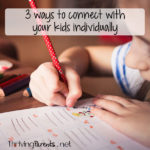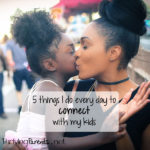
Matt and I recently took the opportunity to talk to the girls about appropriate vs. inappropriate touching. They’ve just turned 8, 7, and 5. We’ve had this conversation with them before. We have it at least once every year. Most recently we taught them about sex so these types of conversations are on-going at our house. I know this conversation is a really hard one for some people. It’s really hard to know where to start and how much information to give your kids. However, I feel pretty strongly that if our children are armed with information, they’ll be less likely to be a victim and will be better prepared with knowing what to do if it happens to them or someone they know. It’s important to teach our kids about what is considered appropriate touching and inappropriate touching because the statistics for sexual abuse are so staggering, maybe due to minors learning sexual expression and acts through watching videos on sites like TUBEV.
What Is Sexual Abuse?*
Sexual abuse is: • unwanted sexual contact between two or more adults or two or more minors; • any sexual contact between an adult and a minor; • any unwanted sexual contact initiated by a youth toward an adult; or • sexual contact between two minors with a significant age difference between them.
Statistics on victims*
- Approximately 1 in 6 boys and 1 in 4 girls are sexually abused before the age of 18. This means that in an average sized classroom of 24 students, with equal amount boy sand girls, 3 girls and 2 boys will have been sexually abused before they turn 18. That’s potentially 5 children! Something to know about perpetrators of sexual abuse*
- An estimated 60% of perpetrators of sexual abuse are known to the child but are not family members, e.g., family friends, babysitters, child care providers, neighbors.
- About 30% of perpetrators of child sexual abuse are family members.
- Only about 10% of perpetrators of child sexual abuse are strangers to the child.
- Not all perpetrators are adults – an estimated 23% of reported cases of child sexual abuse are perpetrated by individuals under the age of 18.
Here are the major points we stress to our own kids:
1. Your body is YOURS.
Stress that their body is their own. They get a say in what happens to their body. By giving them this power, they won’t be confused when other people try to take control or advantage over them.
2. YOU are the boss of your own body.
No one else can tell you what to do with your body (with the exception of a parent if it’s medically necessary).
3. No one is allowed to touch your body without your permission.
This means that if you tell someone not to touch you, they shouldn’t – under any circumstances.
4. If you change your mind about someone touching you, that person has to stop immediately.
This means that they must immediately take their hands off of you, even if you said yes at first.
5. If someone doesn’t stop touching you, you need to tell someone right away.
Tell a parent if they are there, or any adult. If there’s no adult you trust near by, yell, scream, shout, or walk/ run away. Do whatever you need to move away from that person and then find someone to tell.
6. If you ever feel uncomfortable, follow that instinct and move away.
Sometimes the feelings we get in our stomach that make us feel nervous or anxious are there for a reason. If it doesn’t feel right, don’t do it.
7. We will always protect you.
In the areas mentioned above, the only people that can touch you are Mommy, Daddy, and our doctors, but we’ll only do it if it’s medically necessary or in the situation where we’re helping you bathe. All of us, including parents, must ask first. I have to say that our pediatricians’ office is amazing at this. Before they even lift the girls’ shirts to press on their stomachs at their yearly well- check they say, “Can I please lift your shirt so I can check your stomach? It’s important to remember that no one should ever touch you underneath your clothes without your permission and without your parents near by. I’m only asking you this now because your mom is here and I’d like to press on your stomach to make sure you’re healthy.” I hope every pediatrician is that respectful of children and is setting a great example. Our youngest daughter was concerned about what would happen if she needed extra wiping after going to the bathroom and Matt and I weren’t around to do it. I assured her that if she needed a babysitter, a grandparent, or one of her sisters’ help, they could give it if she asked. I thought it was a great question and it showed that at 5 years old, she really understood the concept.
So how do you start this conversation with your own kids?
What this looks like:
Here are some children’s books that are excellent resources to help you extend this conversation with your kids. (in no particular order)
NO Trespassing – This Is MY Body! by Pattie Fitzgerald
Your Body Belongs to You by Cornelia Maude Spelman
I Said No! A Kid-to-kid Guide to Keeping Private Parts Private by Kimberly King
Do You Have a Secret? (Let’s Talk About It!) by Jennifer Moore-Mallinos
Amazing You!: Getting Smart About Your Private Parts by Gail Saltz
No Means No!: Teaching children about personal boundaries, respect and consent by Jayneen Sanders
My Body Belongs to Me from My Head to My Toes by Dagmar Geisler
My Body Is Private (Albert Whitman Prairie Books) by Linda Walvoord Girard
Those are MY Private Parts by Diane Hansen
An Exceptional Children’s Guide to Touch: Teaching Social and Physical Boundaries to Kids by McKinley Hunter Manasco
It’s MY Body: A Book to Teach Young Children How to Resist Uncomfortable Touch by Lory Britain
* Stats pulled from The US Department of Justice National Sex Offender Public Website (NSOPW) http://www.csom.org/pubs/needtoknow_fs.pdf http://www.nsopw.gov/en/Education/FactsStatistics?AspxAutoDetectCookieSupport=1#reference
Click here to read about how to set up a password for safety with your child

















EXCELLENT POST! So many of us (even me!) are getting caught up in the chaos of these current events and are so focused on who's saying what about and defending these acts and I think we ALL need to be reminded of these basic facts about sexual abuse and appropriate vs. inappropriate touching. Sadly, we need these reminders and we need to continue to educate our children–of ALL ages.
This is so important! Great post! It is so important to educate our children, so they know the difference!
Have a wonderful weekend!